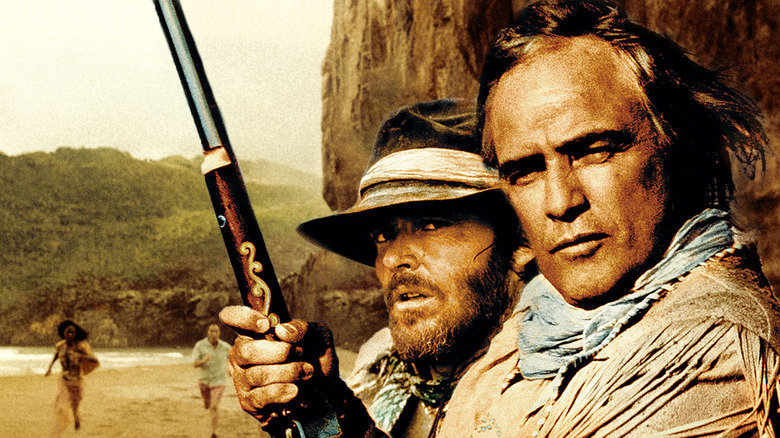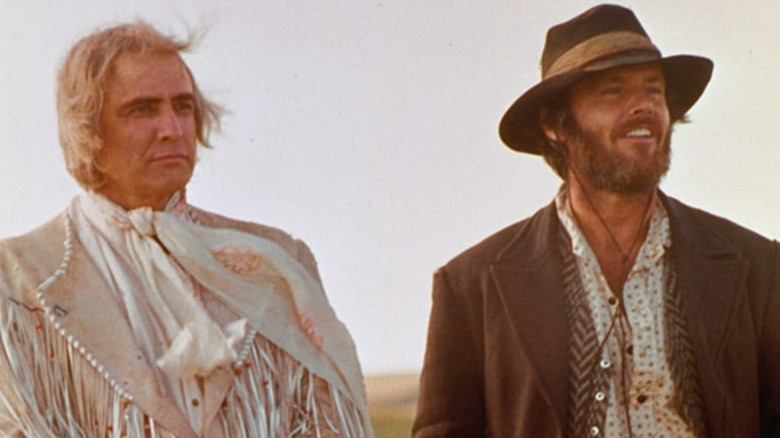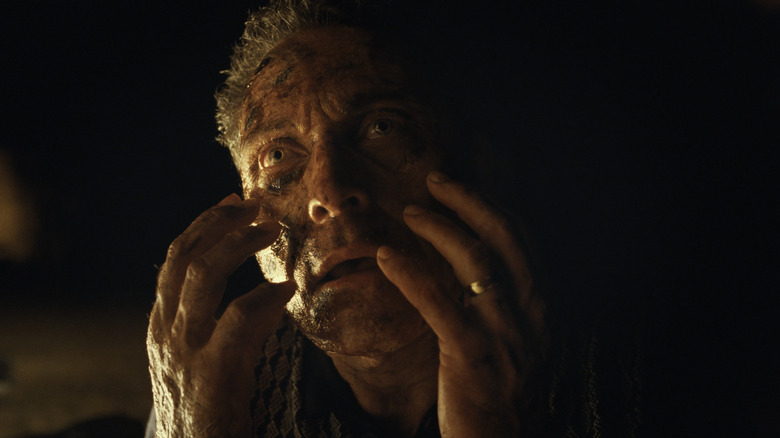M. Night Shyamalan Paid Homage To A Forgotten Marlon Brando And Jack Nicholson Western
A beach that makes you old sounds right in the wheelhouse of M. Night Shyamalan, the filmmaker who gave us aliens that emit poison gas from their wrists in "Signs" and airborne plant toxins that make you kill yourself in "The Happening." And a beach that makes you old is the premise at the heart of Shyamalan's movie "Old," itself loosely based on the French comic book "Sandcastle" written by Pierre Oscar Levy and illustrated by Frederik Peeters.
Where the beach was little more than a magical realist conceit that Levy and Peeters employed to explore mortality and existence in "Sandcastle," Shyamalan takes this setup and runs wild with it. "Old" isn't just a film where a bunch of strangers visiting a secluded beach suddenly begin to age one year every half-hour; it's a mystery-thriller where characters spend a lot of their dwindling time unraveling the sci-fi mechanics of how the beach works. Shyamalan also tosses in a sub-plot involving an insidious organization that conspired to bring this specific group of people together for a greater purpose. The filmmaker himself drives the point home with one of his trademark cameos, delving even deeper into meta territory (but with a playful wink) than that time he played a writer literally destined to change the world in "Lady in the Water."
"Old" is a lot, in other words. Yet, for all the things that don't work in the movie, it's far too personal and go-for-broke bizarre — be it in terms of plot, tonal shifts, or the baffling spots Shyamalan chooses to place the camera — to dismiss out of hand. There's perhaps no better example of this than the way "Old" pays homage to a long-forgotten 1970s western starring Marlon Brando and Jack Nicholson (!), as directed by Arthur Penn (!!) of "Bonnie and Clyde" fame.
Remember that movie? Shyamalan's dad does
Directed by Arthur Penn from a script by Thomas McGuane ("92 in the Shade," "Tom Horn"), "The Missouri Breaks" stars Jack Nicholson as Tom Logan. The leader of a group of cattle thieves, Tom sets out to seek revenge against a land baron who killed a member of his gang by buying a farm near their ranch and stealing horses from it. In retaliation, the baron turns to Robert E. Lee Clayton (Marlon Brando and, yes, that's really his character's name), an eccentric shooter-for-hire or "regulator" who pledges to take down Tom and his crew.
Despite arriving on the heels of Brando and Nicholson's respective Oscar-winning roles in "The Godfather" and "One Flew Over the Cuckoo's Nest," "The Missouri Breaks" was a box office disappointment upon its release in 1976. The movie has yet to attract a cult fanbase, and M. Night Shyamalan admitted he hasn't actually seen it in an interview with FOX. All the same, he decided to reference it in "Old" by having Charles (Rufus Sewell), a middle-aged surgeon with schizophrenia, constantly allude to the film as the beach ages him, causing him to rapidly develop dementia.
As the filmmaker explained:
"I've never seen ['The Missouri Breaks'] ... It's from my dad [Dr. Nelliyattu C. Shyamalan], who actually has some dementia, and he would not stop talking about Jack Nicholson and Marlon Brando, this movie that they were in. And I was like, 'Dad, I have never seen it.' And he goes, 'Jack Nicholson! Marlon Brando!' And he kept going on and on about it. I was like, 'Dad, I'm putting this in a movie if you keep talking about this.' And he did."
Shyamalan, good or bad? The answer is... yes
If you're like me, dear readers, you're of two minds about M. Night Shyamalan the filmmaker. The unnatural dialogue he writes is clearly a stylistic choice, but that doesn't make it any less clunky to listen to. His use of genre tropes (be it sci-fi, fantasy, or horror) to explore themes about the human condition and spirituality is audacious, yet he can't stop chasing the high of "The Sixth Sense," the result of which is he keeps making movies where the big twists and reveals fall flat. Then there's his formalist visual style, which at times is fantastic, while at other times it can be overly distracting or muddle the meaning of what Shyamalan is trying to convey.
We could go on (like his continued misuse of mental illness as a plot device), but you get the idea. At the same time, he's someone who invests so much of himself in his art, even pouring his own money into making them. You can see it when he talks about his films, too, like his take on what the nod to "The Missouri Breaks" signifies in "Old:"
"For me it represents this thing that someone's holding onto for their sanity. Everyone must know, these are the two greatest actors of all time, why doesn't anybody know this? And so they can't understand this but they're holding onto it... It was just a kind of funny, sad, beautiful thing about my dad and cinema."
Then there's the way Shymalan refuses to join a current franchise while forgoing movies based on "safe," well-known IPs in favor of making either original, riskier, low-to-mid-budget thrillers or, in the case of "Old," a film based on relatively obscure source material. It's what keeps me coming back to his work, time and time again, enough so I can say there's a part of me that loves all his movies, no matter how the final product turns out.
Rest assured, when his next movie, "Knock at the Cabin," arrives, I will be ready to get hurt again.


